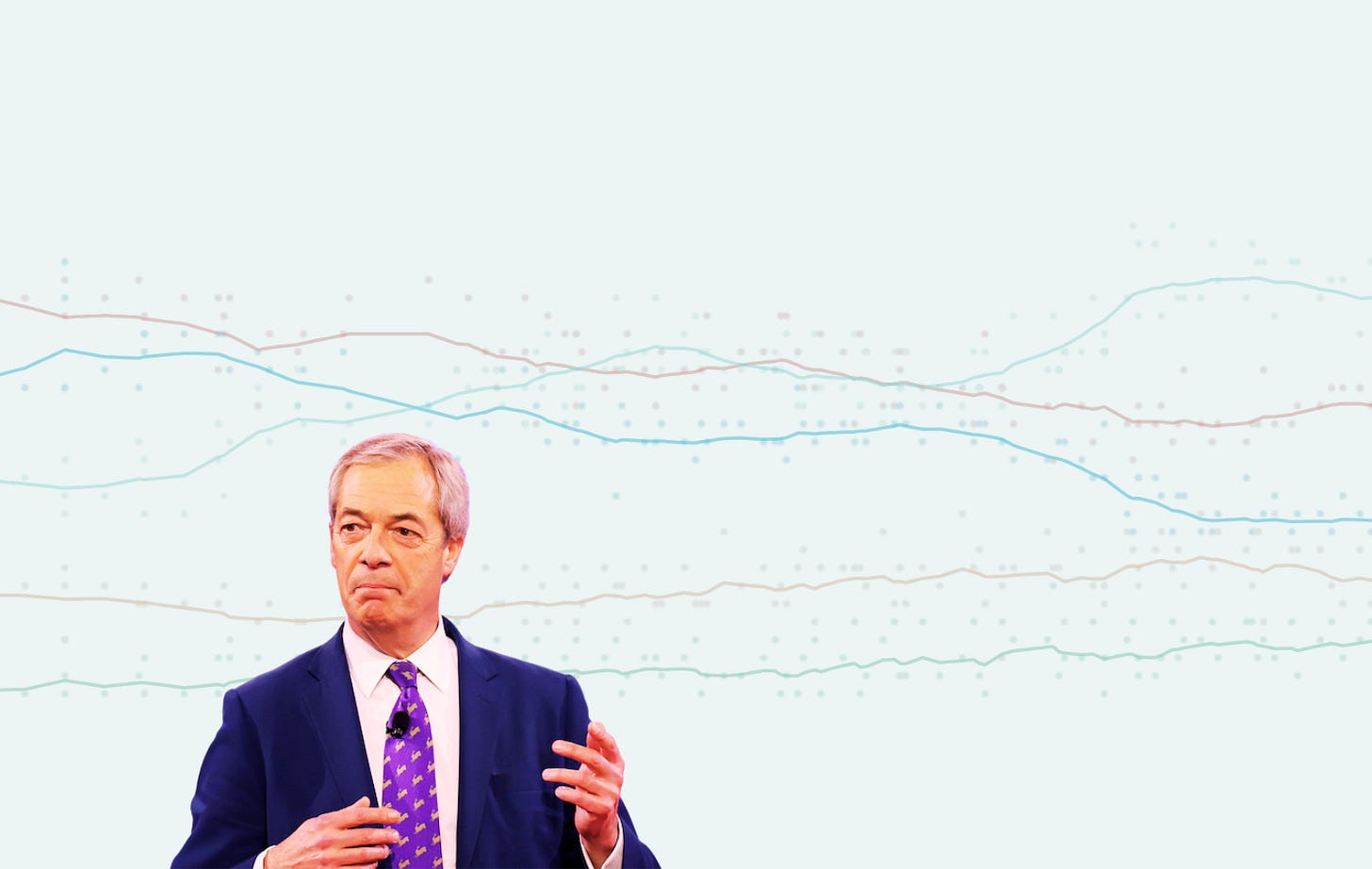It’s the burning question of British politics right now: is Nigel Farage’s momentum unstoppable? And if not, how can his march to Downing Street be curtailed?
A new study released today addresses this very issue – delivering some interesting conclusions.
The research, commissioned by the non-partisan think tank Persuasion UK, tested the impact of various anti-Reform attack lines on 6,000 UK adults.
Five groups were each presented with a different attack line – criticising Reform’s anti-asylum approach, its denial of climate facts, Farage’s support for NHS privatisation, the party’s fossil fuel donors, and its closeness to U.S. President Donald Trump.
Those involved in the experiment were surveyed before and after they were presented with the information, to assess Reform’s potential vulnerabilities.
One of the attack lines towered above the rest, according to Steve Akehurst, who was behind the research. His analysis points out that “by far the most impactful” message – in terms of damaging Reform’s popularity – was exposing its extensive ties to fossil fuel interests and corporate donors.
Persuasion UK presented one group with the findings I revealed last year – that, between 2019 and 2024, Reform received more than 90% of its funding, £2.3 million, from individuals and companies linked to polluting industries and climate science denial.
Bringing this information to the attention of voters pushed down Farage’s popularity and “was the only message to significantly reduce willingness to vote for Reform”.
Akehurst reckons this attack line was particularly effective because “it tapped into a general mood of cynicism to politicians and hostility to big business”. He said that it also provided “an explanatory framework” for why Farage advocates for lower taxes on the rich and the rolling back of workers’ rights – not to mention his fanatical opposition to clean energy.
Farage’s shtick is to pose as a champion of the working man, fighting against out-of-touch elites and corrupt institutions. But this new research shows the importance of exposing Farage’s foundational myth: namely, that Reform isn’t a grassroots rebellion; it’s a vehicle bankrolled by the financiers who crashed the economy in 2008 and the austerity-obsessed corporate vandals who have profited ever since.
When you expose these facts – as this Substack (and all of my work) is dedicated to doing – Farage loses support. When these stories come to people’s attention, the Farage fallacy starts to make sense; it becomes palpably obvious that his agenda is dressed up as an anti-establishment crusade while being paid-for by corporate interests.
One other attack line also significantly dented Reform’s support, according to the research: Farage’s relationship with Donald Trump. When this fact was highlighted to the group, Farage’s favourability fell by 10.6 percentage points, and Reform’s favourability by 8 points.
Farage doesn’t seem to be suffering from this fact in the polls currently. However, as the election drags nearer, and the President’s demagoguery becomes ever-clearer, Farage’s decision to be Trump’s closest European ally could become a major electoral hindrance.
As Akehurst states: “Contrary to what you’d think from various parts of the media, Trump is deeply unpopular in the UK including with some Reform voters... Using Farage’s personal closeness to Trump to make an argument about his ideological closeness, and what that means for the country, proves damaging to Reform.”
As for the other anti-Reform attack lines – on the NHS, asylum, and climate denial – none really dented Farage’s support. There was even some evidence that attacking Farage over his asylum extremism increased the salience of immigration as an issue and actually increased the level of sympathy for Reform among the voters surveyed.
These are crucial insights for Farage’s opponents. Rather than chasing Farage on immigration or parroting his populism, they should pull back the curtain and show the financial machinery behind Reform’s rise.
Because what cuts through, this research shows, is the fact that Farage’s party isn’t anti-establishment – it’s just a new front for the same old elite.
Of course it’s difficult to spread these facts, when the media is owned by the same elite that is funding Farage’s outfit. But through publications like this one, we can at least make a start.
“One of our finest investigative journalists”
– Peter Oborne
About me
I’m an investigative journalist and current affairs writer who has worked with the New York Times, the Guardian, the Mirror, the New European, Novara Media, New Statesman, Led By Donkeys, and others.
I specialise in exposing dark money and radical right-wing ecosystems.
I also write a lot about inequality and elitism, and am the author of two books on those very subjects: Fortress London, and Bullingdon Club Britain.
Why subscribe
Trump, Musk and Farage are on the march – followed closely by Badenoch and an increasingly radicalised Conservative Party. Investigative journalism exposing their funding sources, their plans, and their networks has never been more important.






One thing for sure, Labour’s recent attempt to “out Reform” Reform is the polar opposite of an effective anti Reform strategy!
We have to hope Labour’s leadership is listening to this!
He’s also been seen visiting 55 Tufton Street. Probably visiting the friends of Liz Truss!